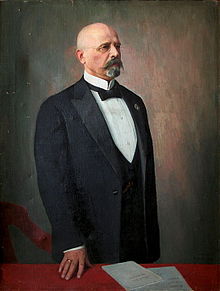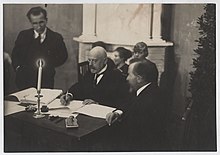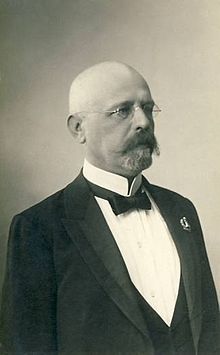Jaan Poska
Jaan Poska (originally Ivan Poska ; born January 12 . Jul / 24. January 1866 greg. In Laiusevälja today Landsgemeinde Jõgeva , Estonia , † 7. March 1920 in Tallinn ) was an Estonian politician.
Early years
Poska was born the fifth of twelve children to a poor Russian-speaking family. His father was a sexton , the family milieu was shaped by Orthodox clergy. Poska first went to the orthodox village school of Tuhalaane (today the rural community of Karksi ), then to the parish school in Laiuse . He then moved - supported by the Orthodox Church - to the Spiritual Seminary in Riga (Рижская духовная семинария), where he graduated from secondary school. In 1882 the father died; the mother moved to Tartu, where a son studied. In 1886 he graduated from high school in Tallinn as an external student.
1886 Poska began to study medicine , before turning a year later at the Law Faculty of the University of Tartu in Livonia Tartu enrolled. He also attended courses and lectures in German studies . Under the pseudonym Jaan Karu , he published translations from Russian, including by Alexander Pushkin and Peter the Great .
Politician

Jaan Poska graduated from law school in 1890. He established himself as a lawyer in the Estonian capital Tallinn. In 1904 he was elected city councilor and in 1905 chairman of the city council. In the revolutionary year of 1905 he was briefly imprisoned by the tsarist state power for political reasons, but was then able to continue his career in local politics. Poska was Lord Mayor of Tallinn from 1913 to 1917.
The February Revolution in Russia in 1917 brought about far-reaching changes in Estonia's political life. Poska played a key role in the revolutionary years of 1917/18 and in the creation of Estonian state independence.
In March 1917, the new Russian government united the Estonian settlement area (the Estonian governorate and the northern part of the Livonia governorate ) into one administrative unit. The previous tsarist governor of Estonia was deposed. From March to October 1917 Poska took his place as governor of the Russian provisional government . In autumn 1917 Poska was elected a member of the All-Russian Constituent Assembly (Всероссийское Учредительное собрание). He belonged to the conservative national liberal Estonian Democratic Party ( Eesti Demokraatlik Erakond ).
Minister and Diplomat

On February 24, 1918, the Rescue Committee in Tallinn , authorized by the Provisional Parliament of the Estonia Governorate , the so-called Maapäev , proclaimed Estonia's detachment from Russia and the state sovereignty of Estonia. Jaan Poska was appointed Foreign Minister in the (first) Provisional Government . However, Estonia remained occupied by German troops from the end of February to mid-November 1918, so that the government could not exercise actual state authority.
On November 12, 1918 Jaan Poska became Deputy Prime Minister and Minister of Justice in the (second) Provisional Government , then from November 27, 1918 to May 9, 1919 in the (third) Provisional Government of Estonian Foreign Minister.
Poska's main task was to achieve international recognition and support for Estonian independence, especially among the Western powers. On November 13, 1918, Soviet Russia began a military offensive to recapture the Baltic region by attacking the East Estonian city of Narva . The Estonian War of Independence began.
In 1918/19 Poska traveled to Western Europe as diplomatic envoy. He took part as Estonian representative at the Paris Peace Conference in 1919 . In the same year he returned to his home country. The government appointed him head of the Estonian delegation to the upcoming peace negotiations with Soviet Russia, which were officially opened in December 1919. The war ended with an Estonian victory in early 1920. On February 2, 1920, both states signed the Tartu Peace Treaty , which confirmed Estonian independence.
Poska was elected to the Constituent Assembly of the Republic of Estonia ( Asutav Kogu ) in April 1919 . He died surprisingly a year later in Tallinn. A museum has been set up in his former home in the Kadriorg district of Tallinn since 2008.
Private life
Jaan Poska was married to Constance Ekström (1870–1926) since the end of 1895.
The Poska family attached great importance to the education of their male and female children. Among the best known are the doctor Ksenia Poska (1896–1964), the lawyer Vera Poska-Grünthal (1898–1986; married to the lawyer Timotheus Grünthal ), the historian Tatjana Poska (1900–1988; married initially to Aleksander Arder , later with Eduard Laaman ), the lawyer Jaan Poska (1902–1941), the translator Anna Poska (1905–1986), the lawyer Helena (Jelena) Poska – Niinemanni (1907–1939) and the lawyer and clergyman Jüri Poska (1919–1974) .
literature
- Eduard Laaman : Jaan Poska. Eesti riigitegelase elukäik. Tartu 1998 (reprint of 1935 edition)
- Eesti elulood. Tallinn: Eesti entsüklopeediakirjastus 2000 (= Eesti entsüklopeedia 14) ISBN 9985-70-064-3 , p. 377
Web links
- CV (Estonian)
- About Jaan Poska (histrodamus.ee)
| personal data | |
|---|---|
| SURNAME | Poska, Jaan |
| ALTERNATIVE NAMES | Poksa, Ivan |
| BRIEF DESCRIPTION | Estonian politician |
| DATE OF BIRTH | January 24, 1866 |
| PLACE OF BIRTH | Laiusevälja , today the rural community of Jõgeva , Estonia |
| DATE OF DEATH | March 7, 1920 |
| Place of death | Tallinn |

